Your residence serves as a sanctuary, providing a secure and sheltered environment for you and your loved ones. It is more than simply a physical location; it is a sanctuary for treasured recollections and the individuals who are important to you. In order to preserve this safe place, numerous homeowners rely on security systems, which are a comprehensive risk management approach that provides assurance and defense against various dangers.
Analyzing the concept of risk management within the framework of home security:
In the realm of risk management, the main objective is to recognize possible hazards and execute methods to alleviate them. Within the domain of residential security, these hazards may encompass theft, unauthorized entries, conflagrations, and medical crises. An all-encompassing security system mitigates these threats by offering many tiers of safeguarding.
Risk management refers to the process of identifying, assessing, and mitigating potential risks in order to minimize their impact on an organization or project. Risk management involves the process of detecting and mitigating potential hazards before they escalate into significant catastrophes. Consider it as a personal safeguard intended to intercept any potential downfall. Through the identification of possible hazards, evaluation of their consequences, and development of strategies to either mitigate or manage them, we safeguard the most important assets. It is not solely about evading issues, but rather about being ready for them.
The primary goals of risk management
- Reduce the likelihood of adverse effects on property and personal well-being:
Installing a home security system serves as a proactive barrier, protecting your property and loved ones from both criminal acts and environmental dangers. Imagine it as having a vigilant neighbor always monitoring the situation—that’s how efficient this is.
- Ensure financial stability by mitigating or avoiding losses:
Envision the scenario when you awaken to discover that your residence has been burglarized and your important possessions have been stolen. An effectively integrated home security system can mitigate potential financial losses, ranging from theft incidents to insurance claims. Installing a security system for your home is a prudent decision that offers financial savings and minimizes potential problems. It serves as an effective risk management method.
- Improve general safety and decrease anxiety:
Have you ever had the disconcerting feeling of uncertainty over the true security of your residence? A security system serves as a deterrent, mitigating potential risks and instilling a sense of tranquility. This convenience not only benefits your safety, but also alleviates tension and improves your sleep quality at night.
- Ensure adherence to insurance and other regulatory mandates:
Are you aware that numerous insurance policies provide discounts if you have a security system installed? This provides more than simply a monetary advantage. By fulfilling these criteria, you reinforce the importance of a home security system as a crucial element of risk management.
Categories of Hazards:
When it comes to safeguarding your house, it is crucial to have a comprehensive grasp of the various types of threats that you may encounter. The risks can be classified into three primary categories: operational risks, financial risks, and external risks.
1. Operational risks
Operational risks pertain to the potential hazards that emerge from the routine activities and functioning of your residence. These hazards may encompass incidents, mechanical breakdowns, and human fallibility. For instance, failing to turn off a stove flame or neglecting to secure the front door can result in possible hazards.
In order to reduce operating hazards, it is crucial to establish and adhere to safety rules inside your household. This entails conducting frequent inspections of smoke alarms and carbon monoxide detectors, upkeeping the electrical and plumbing systems of your home, and verifying the proper functioning of all equipment.
2. Monetary hazards
Financial risks are hazards that can affect the financial stability of your house. These risks may encompass unforeseen expenditures, such as repairs or replacements, as well as fluctuations in property prices. For instance, if your residence is situated in a flood-prone region, you can have elevated insurance expenses or encounter challenges while attempting to sell your property.
In order to minimize financial risks, it is crucial to create a budget and adhere to it consistently. This can involve allocating funds for unforeseen expenses and constantly evaluating your insurance policies to ensure that you have sufficient coverage.
3. Exogenous Hazards
External hazards are risks that originate from sources outside of your control. These hazards may encompass natural calamities, criminal activities, and fluctuations in the economy. For instance, if your residence is situated in a region that is susceptible to hurricanes, you can encounter possible harm caused by strong winds and inundation.
In order to reduce or minimize external dangers, it is crucial to be adequately prepared. This may involve keeping an emergency kit readily available, implementing security systems, and routinely assessing your insurance plans to guarantee sufficient coverage.
It is crucial to have a comprehensive knowledge of the various sorts of dangers that can affect your property in order to formulate an effective risk management plan. To safeguard your house and family, it is crucial to anticipate unforeseen circumstances and comprehend the repercussions of such hazards.

Elements of an all-encompassing residential security system:
An effective security system for your home includes a range of components that are specifically built to collaborate in order to identify, discourage, and protect against any dangers. We will discuss essential components that are vital for successful risk management.
Devices for detecting movement
Imagine this scenario: you are at home, and suddenly, you receive a notification stating that there is motion detected in your garage. Motion detectors are highly effective at detecting any unwanted movement within designated regions. They promptly activate alerts or alarms as soon as they identify any abnormal activity. The early warning system is crucial for risk management, as it enables prompt responses to possible hazards, safeguarding both your property and family.
Video surveillance systems:
Surveillance cameras serve as an additional pair of eyes, constantly watchful. They not only closely monitor your property but also gather evidence that might be quite beneficial for law enforcement. Visualize capturing an unauthorized individual on camera footage—frightening, isn’t it? These cameras act as important deterrents and are essential in any risk management approach. In addition, they offer live monitoring, ensuring your peace of mind regardless of your whereabouts.
Security Systems:
The prospect of an intruder forcibly entering can be a highly distressing notion. However, by utilizing alarm systems, you will be adequately equipped. These devices provide high-decibel alerts that can surprise trespassers and promptly notify you of potential dangers. Additionally, several of these devices have the capability to establish a direct connection with emergency services, thereby guaranteeing prompt assistance. Consider alarms as the initial security mechanism for your property, forming a proactive strategy to minimize risks by deterring criminals and ensuring prompt emergency responses.
Intelligent Locking Mechanisms:
Have you ever struggled with inserting keys into a door lock? Smart locks alleviate the inconvenience by providing keyless entry and employing intricate authentication mechanisms. They provide the capability to remotely lock and unlock, providing convenience and enhanced security. By incorporating intelligent locks, you are not only deterring unlawful entry, but also implementing a substantial measure in your home’s risk mitigation plan. These locks provide a secure means of access, allowing only authorized personnel to enter, thereby safeguarding both your family members and your belongings.
A contemporary residence furnished with cutting-edge security measures such as surveillance cameras, intrusion alarm system, and window sensors to ensure efficient risk mitigation. Smoke and carbon monoxide sensors used for monitoring environmental conditions. Envision the olfactory sensation of smoke or a carbon monoxide leak, devoid of any discernible scent, while you are in a state of slumber. Environmental sensors, such as smoke and carbon monoxide detectors, offer timely alerts for these hazardous occurrences. They enable prompt action to avert or alleviate potential dangers. These sensors are vital components of a comprehensive risk management system, protecting your home from the dangers of fire and poisonous gasses.
Emergency buttons:
What would you do if you had a sense of danger or intimidation within your own residence? Panic buttons provide expedited access to emergency services, offering a direct conduit for assistance. Emergency responders are immediately notified upon activation. These buttons improve individual safety by guaranteeing a prompt response in critical situations. To provide thorough protection, we recommend investigating our Apartment Gate Security Solutions. They are crucial for a successful risk management approach, providing residents with a dependable method to handle situations.
How Is Having A Security System For Your Home A Risk Management Strategy?
- Surveillance:
They consistently observe and assess the environment for any possible dangers. This allows you to vigilantly monitor your home even when you are not present. This provides protection against any potential harm to your house.
- Video surveillance:
Residential security systems are equipped with surveillance cameras that continuously capture video footage around the clock. This video footage can serve as conclusive proof in any theft investigation.
- Automated notifications:
At last, you have something that doesn’t provide a notification after the action has been completed. This can also aid in the management of energy consumption, hence contributing to a reduction in utility expenses.
Additional Significance of Home Security Systems:
Prevents the escape of gas:
Some alarm systems offer the option to get alerts in the event that your carbon monoxide or smoke alarms are triggered while you are not at home.
Immediate contact with the authorities can be made, contingent upon your security provider. In addition, heat detectors can be included into your security system. These detectors have the capability to ascertain the presence or absence of a fire within the premises of the building.
Reduces energy expenses:
Home security systems provide automation features that effectively save energy expenses. Certain systems are equipped with luminous LEDs and thermostats that automatically regulate themselves to achieve maximum cost efficiency.
To summarize:
How Is Having A Security System For Your Home A Risk Management Strategy? Installing a home security system can serve as a risk management tactic by deterring burglars and intruders, as well as promptly notifying you and/or the authorities in the event of a break-in. In addition, numerous home security systems are equipped with smoke and carbon monoxide detectors, providing an added layer of protection for your house and loved ones against the risks of fire and other dangers. In addition, possessing a home security system can offer additional advantages such as surveillance, video monitoring, automatic notifications, integration with smart home technology, and reductions in insurance premiums. In general, implementing a security system can offer a sense of tranquility and significantly contribute to safeguarding your belongings and personal well-being.

